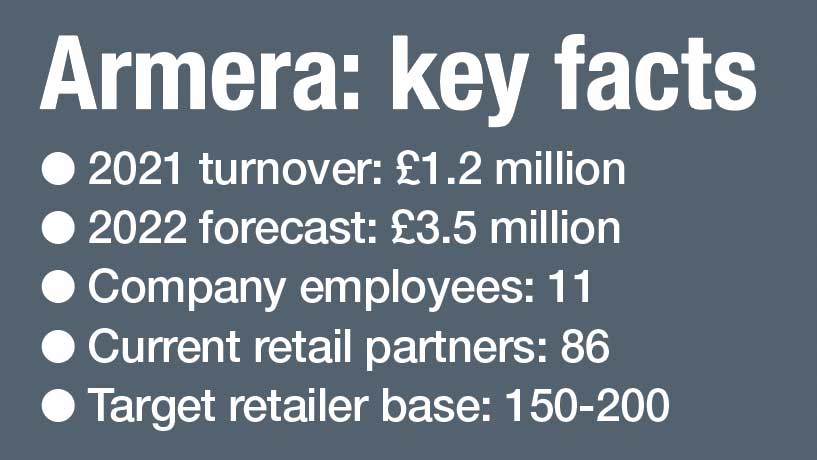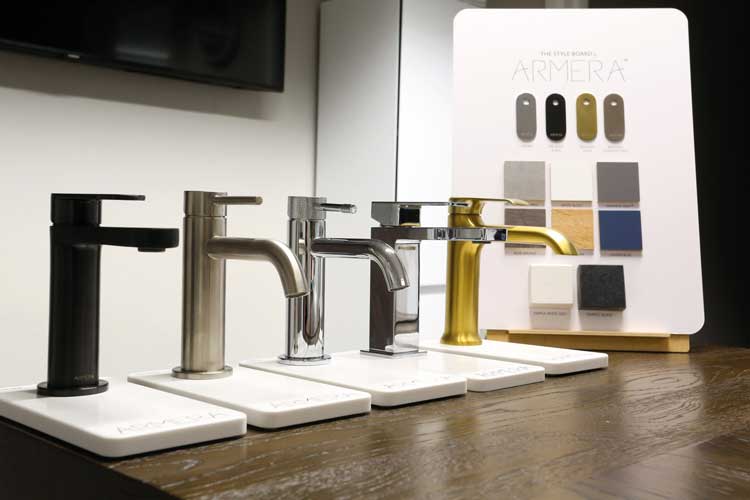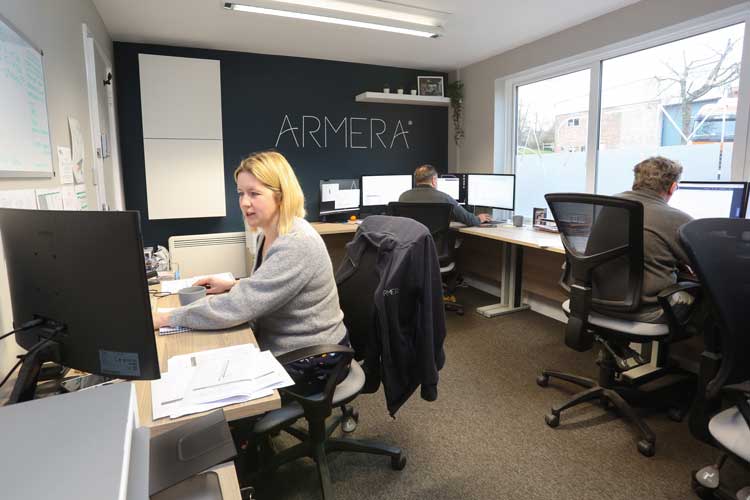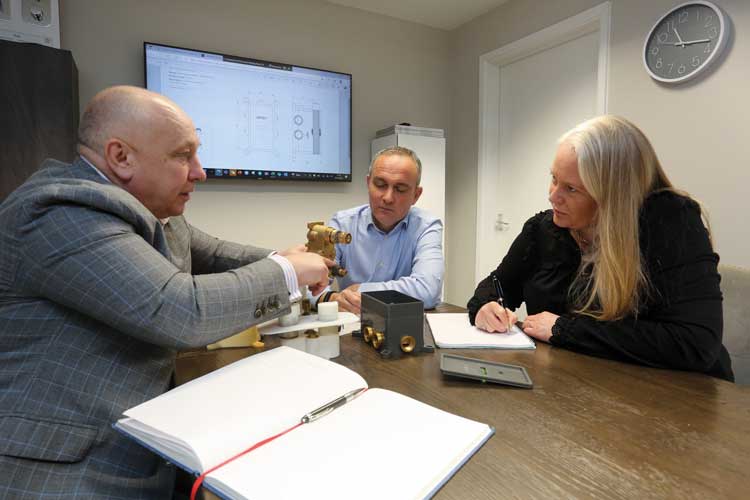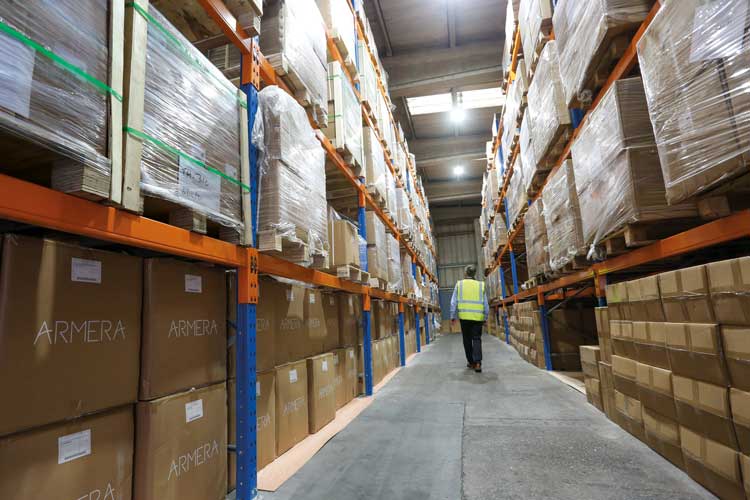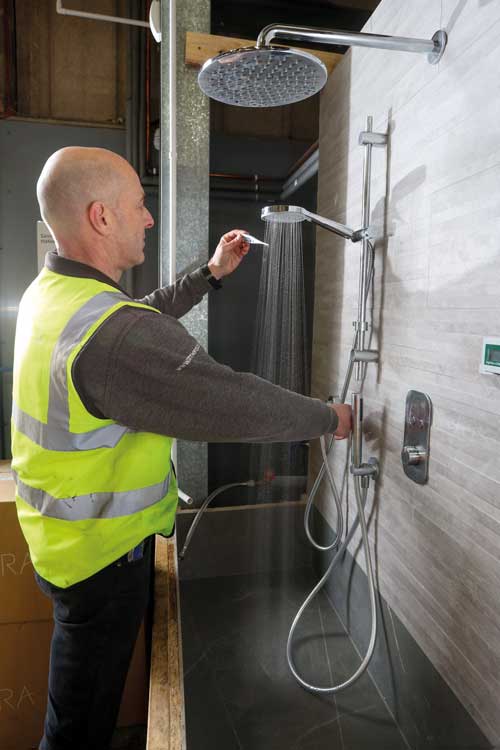Bathroom manufacturer Armera was born from a need to go back to what’s important — a more collaborative relationship with retailers. Matt Baker talks to the team behind the company that is putting values ahead of profit.
Despite having only been trading for 13 months, bathroom manufacturer Armera managed to turnover £1.2 million in 2021, and the goal is to hit £3.5m by the end of 2022. It’s certainly an impressive feat so far, so how has it managed to achieve its success? And is focusing on the needs of the retailer just simply a marketing exercise?
Like many new businesses, Armera was set up because of an apparent gap in the market. In this case, the independent retail sector. The past industry experience of the company founders is the driving force behind Armera. “The retailers we spoke to felt that most manufacturers were turning their backs on independent retail,” says joint managing director Jim Williams. “The growth of national merchants, the DIY sector and the internet meant that manufacturers were chasing those bigger prizes by decreasing the number of accounts and increasing the turnover from those larger accounts. There was a feeling that independent retailers had lost that level of support.”
It was this lack of support and a feeling of frustration from previous experience in the industry that formed the foundation of Armera. But as Jim points out, setting up the business wasn’t a completely altruistic act. “That used to be the bit that we enjoyed the most about our jobs. It wasn’t a case of coming to the aid of retailers and putting together a rescue package, it was all about the relationships. It’s what we loved – getting to know people and having pride in delivering on our promises. That’s when it worked best and what we, as a team, needed to go back to. So, we spotted a gap in the market but it’s also where we wanted to go in life – setting up a business that is about relationships and be something that we really enjoyed being involved in.”
Bricks and mortar retailers
Wanting strong relationships is admirable but what does this mean for retailers? “Commitment and exclusivity,” says joint managing director Sarah Williams. “We don’t want our product sold online. We believe our products are best sold in a physical showroom and, therefore, we’re only dealing with retailers with a physical presence. We’re looking at that group of customers to see who has a seat at the table because it is an exclusive arrangement. It’s not open to all, and we only have a few spaces to fill.”
Jim adds: “We invite like-minded retailers who have that same need to come and join our club. With 20 years’ experience in the market, we know the people who want to work in a certain way, and we’ve been able to pick them to set up our distribution network. We’re also having some open conversations as well. It’s not about trying to land every account we can but sitting down with people and talking honestly about the future. We don’t want a difficult conversation two years down the line where we’re discussing the levels of commitment we need in order to offer that exclusivity.”
Honesty in any relationship is a two-way street. Armera knows its product and what type of consumer it suits, so the sales team talks openly with retailers about the suitability of product. Sales director Dean Pamphilon comments: “We help our retailers understand where Armera is good for each situation. It’s not for every customer that walks through the door. We’ve seen already that once the retailer gets it, the sales orders start flooding in. It’s like they know exactly how to sell Armera.”
Pamphilon also stresses the importance of understanding what goes on in a retail showroom. “I’m a firm believer that almost every sale is generated by a salesperson. Not every sale, there’s always going to be that 15% or so online that will always happen. It’s expensive running a showroom, changing displays, staffing the business, and all the things that comes with it, and retailers were the people we wanted to look after – that’s the horse we’re willing to back.”
Product design and supply
There was a conversation early in the formation of Armera about the business being sales-led, rather than marketing-led. “Sometimes companies can get in the habit of designing what they think is the perfect product, they know how to market it, and they believe they know how it should be sold. And they tell the retailer how the product should be sold,” Jim explains. “When the retailer feeds back that it didn’t quite work and the consumer said something different, they are told that the retailer’s customer must be wrong. We believe we need to change our approach based on feedback, rather than this top down ‘we’re right, you’re wrong’ attitude.”
Armera has close ties to its far east factories on account of operations director, Dan Carter, having previously lived in China. Factories often dictate certain elements which can make products quite rigid, but this doesn’t seem to be a problem for Armera.
As Pamphilon explains: “Dan and Sarah have such strong connections to the factories that it makes it possible for us to adapt and make changes when developing product. The factories trust us and trust our judgement in the UK market. Our key point of difference, as a new business, is that we’ve entered the market having designed and developed all the product ourselves. We can talk with absolute passion and knowledge about how that product was made and why it was made in that way. For me, I can put any of our products in front of someone and say that there is nothing we can do to this product to make it better. It’s as good as a product can be made. We can stand by that because we have been part of the development process. The only people who can say that are the larger companies that are saturated in the market and can no longer offer exclusivity.”
Jim adds: “And that’s where we come back to the enjoyment of what we do. I absolutely love getting phone calls from someone on a job asking a question about installing, let’s say, one of our concealed cisterns. I know exactly what part they are talking about and how it all goes together. Some companies might be too big to be able to connect that kind of knowledge from design to installation.”
The way the products are developed isn’t just on a drawing board or in CAD software, the team have hands-on experience. Pamphilon explains: “When new product has arrived, I’ve been out to showrooms to help fit and can see that maybe the screws might be too soft, so we need to increase the quality of them. It’s little things like that which make a huge difference to the product. And I don’t know any other new business that can have that level of ownership over their product – I’ve certainly not seen it in a long time. It’s a key selling point for us.”
Armera has taken the view that its retail partners aren’t necessarily going to judge the business based on how many items are out of stock, only on its communication around supply and availability. That said, the warehouse space at the company’s headquarters in Warminster is sizeable and packed to the rafters with stock. Armera keeps its portfolio as tight as possible and stocks it in the volumes to be able to operate a reliable service. And at the time of writing, the latest update was that 100% SKUs were in stock.
But as Sarah explains, Armera updates its retailers with a weekly email. “Stock availability is such a common issue for retailers, so we’ve decided to proactively send an update to advise if anything is unavailable. You might think that’s a bit negative, telling people you’re out of stock of something, but it saves embarrassment and hardship for our retailers when selling to their customers.”
Pamphilon agrees: “It’s a real kidney punch when you’ve worked so hard in a retail environment to get the customer to sign on the dotted line, only to find out what you’ve sold is not available or has a huge delay.”
Despite keeping a smaller but well-stocked portfolio, Armera is still launching new product and plans for a new release in July. But there’s a focus on what sells, rather than offering an array of options for the sake of it. Jim says: “Some companies develop product which feels a bit like a marketing stunt, just so they can say that it’s different. The reality is the consumer doesn’t want 20 versions of the same tap. Our retailers get that and find it easy to sell.”
Company ethos
The obvious question when selling the virtues of working with a smaller company is what will happen when said company becomes more successful and grows into something bigger? Sarah explains that Armera has a different kind of strategy. “We won’t ever become so big that we’re over-marketed due to our legal framework, which we’ve heavily invested in, and due to choosing the people we work with. We’re a relationship business and always will be.”
Jim says Armera won’t keep chasing more retailers. “We won’t do that because it’s not what we want out of life. We have good relationships with our retailers, and they trust us when we tell them this.”
It does seem to be something of a pressure point for independent retailers, having heard these kinds of promises from suppliers many times before. Pamphilon explains what he believes retailers are feeling: “Many retailers think that of the bigger brands out there now, a lot have been built by independents. Retailers have extolled the virtues of the products to their customers. So, they feel they have invested in a brand only to have their hearts broken when that brand then offers product to everyone, and they no longer have that connection with the brand.”
Sarah believes Armera is the exclusive solution to that issue, and it all comes back to the product. “The engineering, the financial backing that goes into development and tooling, and the support from our suppliers, it means we can innovate and offer proper product solutions to real issues, based on our experience in the industry.” Relationships is a theme that keeps coming up in conversation with Armera. Pamphilon says it’s all about good old-fashioned values. “It’s knowing our customer’s name and what interests them. We want that level of relationship where our retailer’s business is as important to us as our own business.”
Sarah adds: “You can see we’re all friends here. We’ve known each other for years and have each other’s backs. Being a close-knit group means we can talk to each other any time and not have to pencil in a meeting for a month’s time to discuss feedback from a customer. We can talk about it and sort it out the same day.”
This ethos is peppered throughout the company, from Simon (aka ‘Jubbly’) in the warehouse to Chris who drives the van. As Pamphilon says, it also makes the sales team feel more confident. “Everyone in the business shares the same mentality. So, when I walk into a retail showroom, they comment on our driver being a nice guy who was really helpful by not leaving stock on the curb.”
Armera’s first year has been about setting up, getting stock in place, and building its customer base. The future? Well, the company wants to be known as a brand that offers product that has been built from the bottom up by retailers, based on their experience and expertise. If that goal of £3.5m turnover is to be achieved, then all involved at Armera seem to be going the right way about it.
